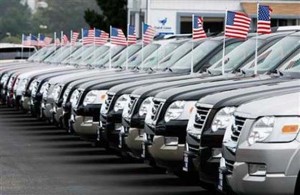Even though Democrats and Republicans have agreed to end their debate over the deficit – for now — new car sales could drop sharply this month, in part due to the impact of the government shutdown and concerns about a possible default, according to the chairman of the National Auto Dealers Association.
David Westcott, NADA’s current chairman, said he wasn’t ready to dispute the forecast by John Krafcik, president of Hyundai Motor America, who said he believed sales could fall by as much as 10%. General Motors and Ford also have expressed concern about the potential impact of the shutdown both on September sales, and on consumer confidence over all.
Westcott was in Detroit to meet with members of the Automotive Press Association where he discussed not only the impact of Washington’s political crisis but also about the growing challenges to the nation’s century-old dealer franchise system. It has been facing sharp attack on a number of fronts, including a concerted effort by automotive newcomer Tesla Motors which wants to sell cars through its own, factory-owned retail network.
(For more on the impact of the shutdown, Click Here.)
On the one sense, 2013 has been a good year overall for U.S. car dealers. The domestic car market has sharply exceeded original sales forecast for the year, but that’s actually created some unusual problems. Westcott, himself a dealer in North Carolina, is like many other retailers who have been facing problems getting a steady supply of some of the more popular products in recent months.
“We’re short of trucks,” said Westcott, who will spend a year as chairman of NADA, the trade group representing around 20,000 American auto dealers.
(A little slowdown may not be a bad thing, suggests Ford’s fourth-in-command. Click Herefor that story.)
Like many retailers, there has been concern that the boom won’t last. Westcott cautioned that, “The economy is very fragile.” But he said he doubted the government shutdown, which started October 1 and had idled more than a 1 million government workers and contractors for 16 days will have any long term impact. “This will pass,” Westcott said.
During his speech, Westcott defended the franchise dealer system, which he acknowledged has been under pressure from Tesla, the Palo Alto-based maker of electric cars which is seeking to sell its products directly to customers without using the long-established franchised dealer approach.
(Tesla wins a round in NY in bid to set up its own factory-run dealer system. Click Here for the story.)
Critics of the franchise system have been using stereotypes to attack the dealer system – but despite long-lived stereotypes, U.S. auto dealers, on the whole, now have very high customer satisfaction numbers and clearly benefits consumers, argued Westcott, who operates his owns a Buick GMC dealership in Burlington, North Carolina.
“Competing against other dealers keeps us customer focused — from financing and servicing vehicles to warranty and safety repairs ,” Westcott said. “If manufacturers were allowed to squeeze out the independent dealers, the competition we create will give way to a handful of national and international corporations, controlling pricing in your local community because there will no longer be intra-brand competition,” Westcott said.
He added the dealer network not only creates competition but also offers convenience, minimizes complexity, collects taxes for local and state government and insures customers can get cash for used vehicles.
Westcott also said took shots at the rules from the new Consumer Financial Protection Bureau, claiming they lack of transparency and could end up hurting consumers by increasing the cost of auto loans.
“The CFPB is pursuing a policy that could weaken competition in auto lending and result in higher credit costs for millions of consumers,” Westcott said. “More and more members of Congress are questioning the CFPB’s so-called ‘fair lending guidance’ that seeks to eliminate dealer-negotiated financing and replace it with a flat fee method of compensation, where dealers are not allowed to discount the financing they offer,” he added.
Westcott said that while the CFPB rules are designed to protect customers from unfair discrimination he has yet to see evidence to justify that claim.

